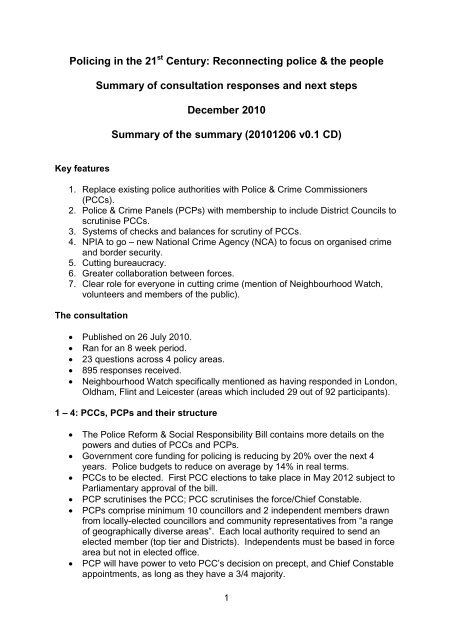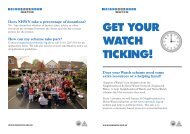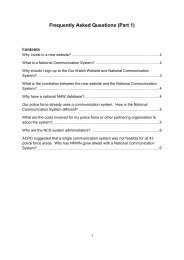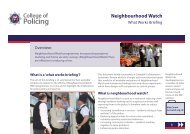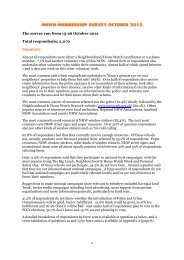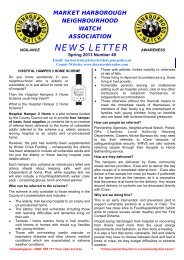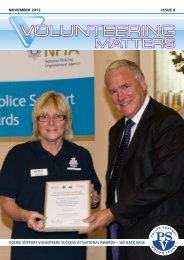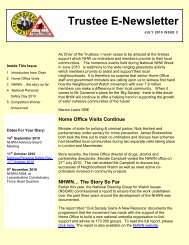Download the report here. - Neighbourhood Watch
Download the report here. - Neighbourhood Watch
Download the report here. - Neighbourhood Watch
Create successful ePaper yourself
Turn your PDF publications into a flip-book with our unique Google optimized e-Paper software.
Policing in <strong>the</strong> 21 st Century: Reconnecting police & <strong>the</strong> peopleSummary of consultation responses and next stepsDecember 2010Summary of <strong>the</strong> summary (20101206 v0.1 CD)Key features1. Replace existing police authorities with Police & Crime Commissioners(PCCs).2. Police & Crime Panels (PCPs) with membership to include District Councils toscrutinise PCCs.3. Systems of checks and balances for scrutiny of PCCs.4. NPIA to go – new National Crime Agency (NCA) to focus on organised crimeand border security.5. Cutting bureaucracy.6. Greater collaboration between forces.7. Clear role for everyone in cutting crime (mention of <strong>Neighbourhood</strong> <strong>Watch</strong>,volunteers and members of <strong>the</strong> public).The consultation Published on 26 July 2010. Ran for an 8 week period. 23 questions across 4 policy areas. 895 responses received. <strong>Neighbourhood</strong> <strong>Watch</strong> specifically mentioned as having responded in London,Oldham, Flint and Leicester (areas which included 29 out of 92 participants).1 – 4: PCCs, PCPs and <strong>the</strong>ir structure The Police Reform & Social Responsibility Bill contains more details on <strong>the</strong>powers and duties of PCCs and PCPs. Government core funding for policing is reducing by 20% over <strong>the</strong> next 4years. Police budgets to reduce on average by 14% in real terms. PCCs to be elected. First PCC elections to take place in May 2012 subject toParliamentary approval of <strong>the</strong> bill.PCP scrutinises <strong>the</strong> PCC; PCC scrutinises <strong>the</strong> force/Chief Constable.PCPs comprise minimum 10 councillors and 2 independent members drawnfrom locally-elected councillors and community representatives from “a rangeof geographically diverse areas”. Each local authority required to send anelected member (top tier and Districts). Independents must be based in forcearea but not in elected office.PCP will have power to veto PCC’s decision on precept, and Chief Constableappointments, as long as <strong>the</strong>y have a 3/4 majority.1
PCPs will not be able to veto proposed budgets or Police and Crime Plans.PCCs will have power to appoint and remove Chief Constables.Fur<strong>the</strong>r details in full response document about how <strong>the</strong> structure will work inWales and London.Concerns: PCCs as single individuals can’t be effective across a whole force area andwon’t be able to engage with communities sufficiently. Checks and balances – will <strong>the</strong>y be too confusing, too bureaucratic and/or tooweak? Political nature of PCCs, especially those supported by <strong>the</strong> main politicalparties. Risks cutting across operational decisions made by Chief Constablesand police officers? Circumstances under which PCCs could dismiss/suspend a Chief Constable. Needs to be fur<strong>the</strong>r clarity about <strong>the</strong> role of local partners in <strong>the</strong> newlandscape. Risk of creating uncertainty between partners. Costs of introducing PCCs and of holding elections.To cost no more than current arrangements. More details about costsaccompany <strong>the</strong> bill. PCCs to be transparent about <strong>the</strong>ir support teamincluding publishing <strong>the</strong>ir salary costs and justifying <strong>the</strong>ir decisions to<strong>the</strong> electorate. Vetting checks (or lack of).Vetting checks would cut across <strong>the</strong> citizen’s right to stand for election.However, PCCs will have to sign an official secrets act document. Increased risk of politicising policing. Also candidates making commitments(as part of campaigning) that <strong>the</strong> force cannot meet.Party political office holders and active party members cannot beappointed to PCC staff. Lines of accountability could become confused. Public could have difficulty indifferentiating between actions/decisions of <strong>the</strong> Chief Constable and <strong>the</strong> PCC. Strong support for independent candidates to stand for election, and aprogramme of activity to encourage this, but concerns <strong>the</strong>y would have lessresource and practical support to do so. Possibility of special interest and minority party candidates being successful –could damage community relations. Potential tension between national and local priorities.5: Cutting bureaucracyPCCs to look at how new technology can help <strong>the</strong>m to stay in touch with <strong>the</strong>people <strong>the</strong>y represent.Mentions knowledge-sharing systems such as POLKA (Police OnLineKnowledge Area) (but <strong>the</strong> POLKA link from <strong>the</strong> NPIA website is no longeractive).2
6. Greater collaboration between forcesSupport for greater consistency between forces in IT systems – nationalapproach.Duty for PCCs to collaborate w<strong>here</strong> to do so would be in <strong>the</strong> interest of <strong>the</strong>collaborating partners as a whole.A single collaboration agreement “that could also include o<strong>the</strong>r partnerorganisations.”7. Clear role for everyone in cutting crime A vision of <strong>the</strong> public having a direct say in how <strong>the</strong>ir neighbourhoods arepoliced (via PCCs). Strong support in consultation responses for PCCs engaging withcommunities. PCCs to be advocates for <strong>the</strong> public. Local accountability and responding topeople’s priorities. PCCs will be able to commission services from CSPs and o<strong>the</strong>r localproviders. Communities to have access to key information on policing, crime anddisorder. Mentions communities taking “an active role in tackling crime and anti-socialbehaviour <strong>the</strong>mselves”. Minimum information will include street level crime data and maps andinformation on NPTs and beat meetings. Mentions ACPO being supported by government and “o<strong>the</strong>r partners” andpolice forces working with “o<strong>the</strong>r local partners”. Potential for police service to take advantage of private sector expertise toprovide value for money. “The public have a clear role in cutting crime by being active to prevent crimeand keep <strong>the</strong>ir neighbourhoods safe, and working with <strong>the</strong> police to bringoffenders to justice.” Responses mentioned need to remove <strong>the</strong> perceived or o<strong>the</strong>rwise risk ofbeing prosecuted for intervening or defending your own property. Strong support for visible and uniformed PCSOs and NPTs on <strong>the</strong> streets. Strong support for <strong>Neighbourhood</strong> <strong>Watch</strong> (page 32). Some concern about risk of vigilantism. Street patrols welcomed, w<strong>here</strong> supported by police. Strong support for ways in which <strong>the</strong> police could give greater responsibility tocommunities. Should be greater support and investment for grassroots organisations. Suggestion of incentives, including recognised qualifications or accreditationtraining that could support education or employment applications. (Relevanceto BTEC.) Identification of lack of time as a barrier to volunteering. Activists felt that activism went far wider than crime/anti-social behaviour andshould be around developing community spirit (or social capital). Need for CJS to be more efficient, flexible and greater focus on victim at allstages.3
Respondents called on central government to better join up working at <strong>the</strong>national level to assist in streng<strong>the</strong>ning successful community safety and CJSpartnership working at a local level.Many respondents said that <strong>the</strong> public would be encouraged to get involved incrime prevention.Partners should be free to develop <strong>the</strong>ir own local targets taking into account<strong>the</strong> needs of <strong>the</strong>ir communities.4


